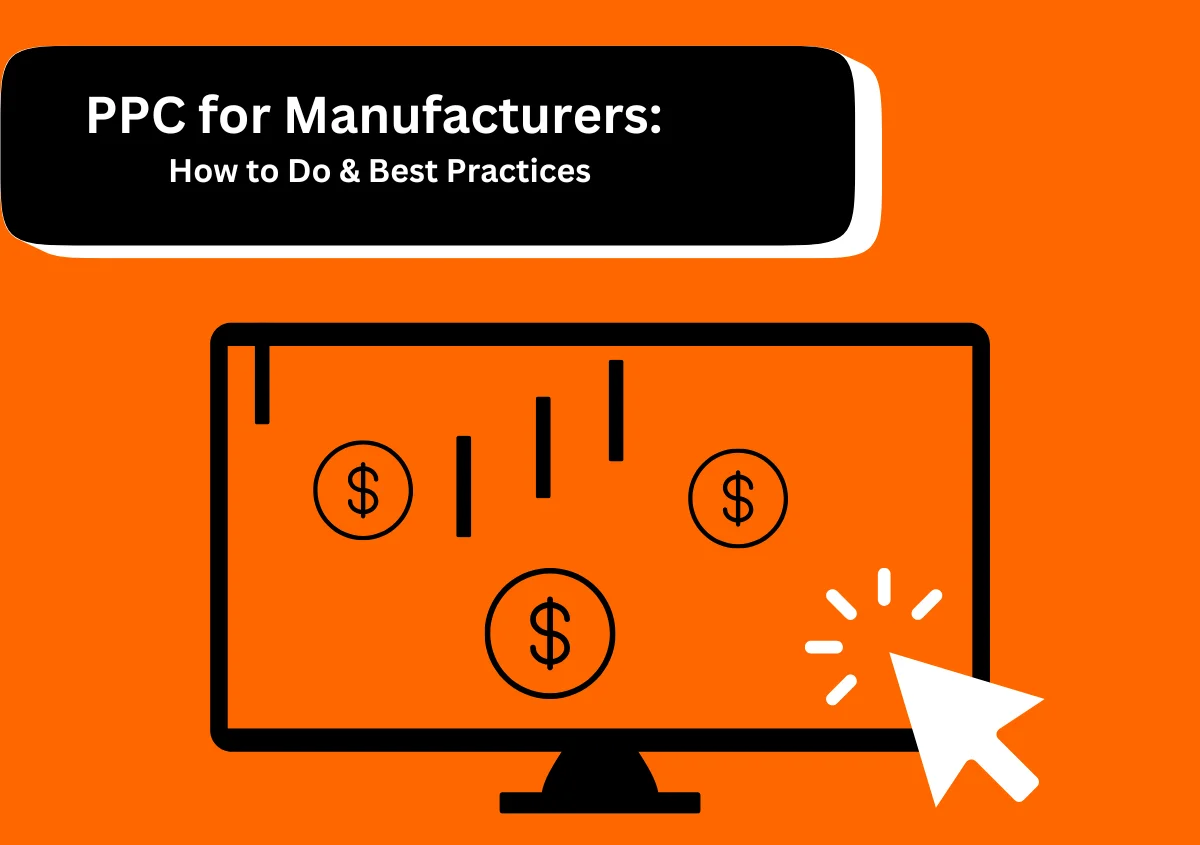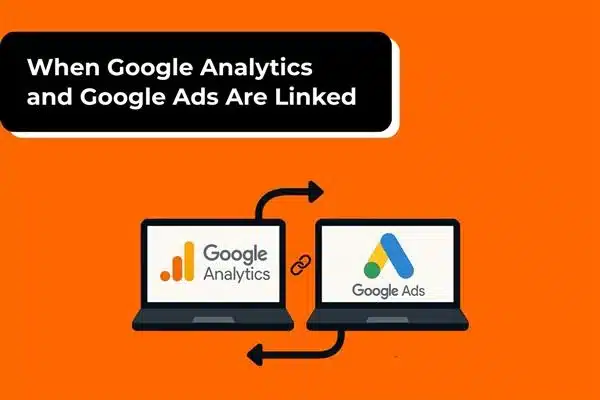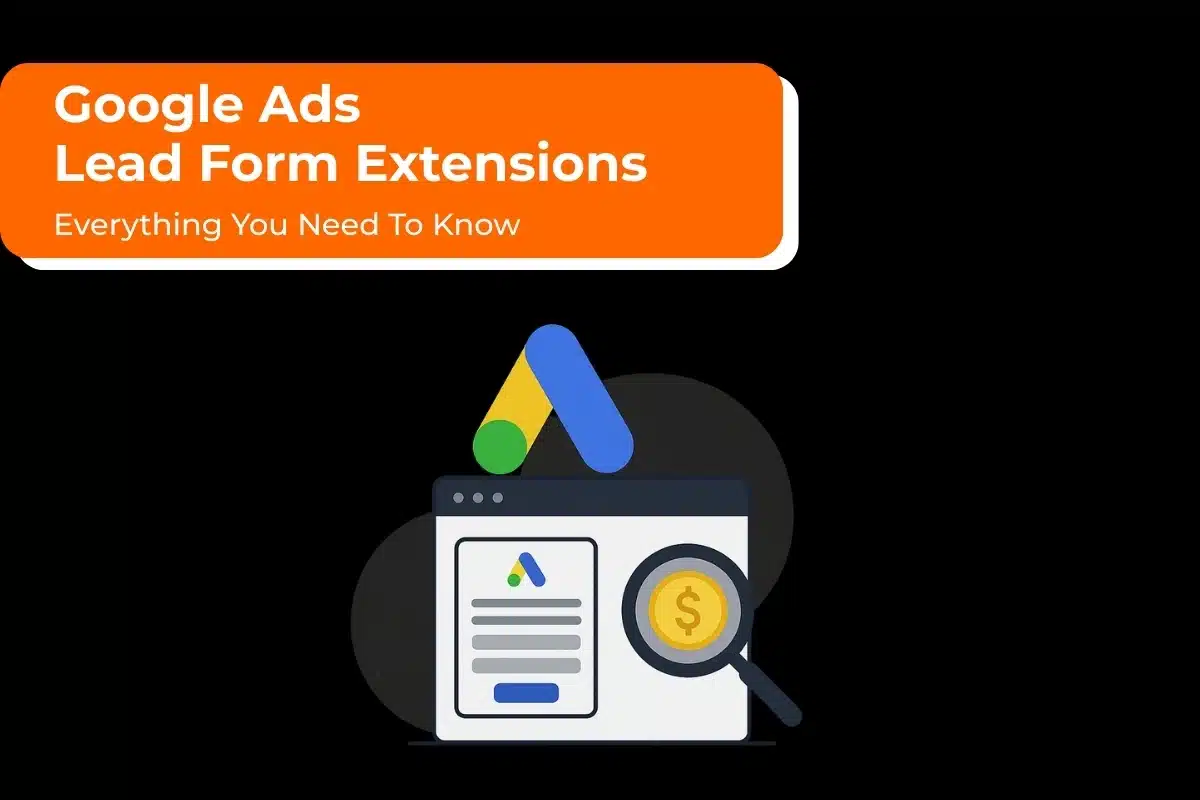Is PPC different for manufacturers? Picture this: You’ve developed an amazing industrial tool that could be the next big thing in manufacturing. But despite its potential, the product isn’t reaching your targeted customers. That sounds familiar, right? This is where pay-per-click advertising can help you bridge the gap between innovation and visibility.
PPC enables manufacturing companies to reach the right audience at the right time. What are your marketing goals—attracting decision-makers, generating leads, or promoting industrial products? No matter what your objectives are, PPC is the solution.
Join me as I explore what PPC is for manufacturers, its multiple benefits, types of PPC ads, and how to make the most of your PPC campaigns.
Looking for PPC strategies customized for manufacturers? Contact our PPC agency to take your manufacturing business to exciting, new levels.
What is PPC for Manufacturers and How Does It Work?
PPC is a digital marketing strategy where you’ll have to pay a fee each time someone clicks on your ad.
PPC ads display your offerings to users when they search for related products or services. For example, a user searching for ‘industrial-grade cutting tools’ might see your ad at the top of the search results. Clicking the ad brings them to your landing page describing the tool’s features and pricing. This direct connection ensures your ad spend attracts high-quality leads ready to convert.
Not sure about how to use PPC to grow your brand? Contact our Google Ads specialist to get started right!
Types of PPC Ads for Manufacturing Companies
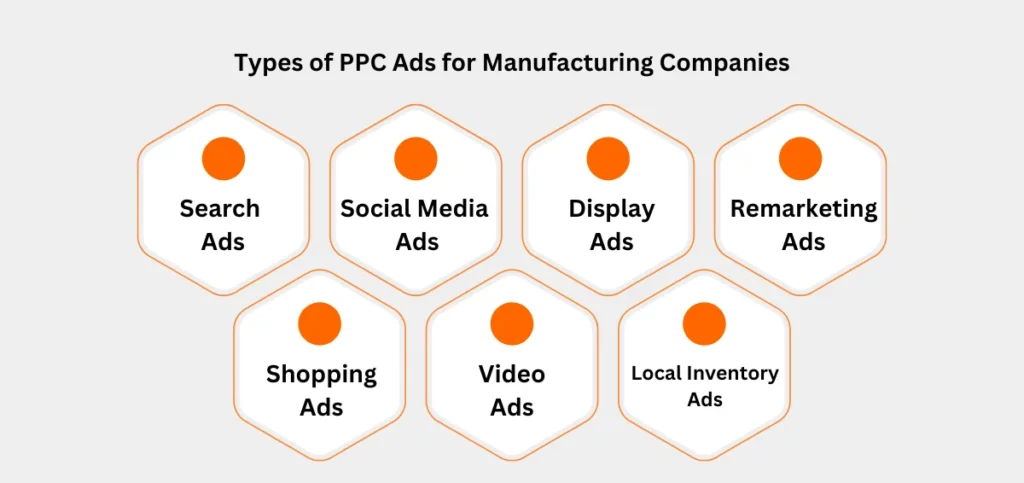
Search Ads
If users are searching for manufacturing solutions that you offer, search ads will lead them to you. For instance, if someone searches for “industrial automation tools,” and your ad appears right at the top of the results, it will immediately catch their attention. Make sure your search ads have compelling ad copy to receive inquiries, calls, and purchases.
Social Media Ads
Social media platforms such as Facebook, Instagram, and LinkedIn offer exciting advertising potential to take your business to the right audience. Make sure that your ads are creatively designed to align with the sensibilities of the specific platform.
Display Ads
These ads appear as banners on websites within Google’s Display Network and are usually used to build brand awareness. Plus, you can go a step further and use display ads to complement search ads. So, if visitors have viewed your search ad and left without converting, the display ad will remind them of your brand during a later search.
Remarketing Ads
Sometimes, visitors view your ad and even click on it, but do not convert. It means they expect something extra to take that leap. For example, if a visitor viewed your product page but left without making a purchase, a remarketing ad highlighting your discount sales might persuade the visitor to make a purchase. These ads follow up on leads and encourage return visits until they’re ready to take action.
Shopping Ads
These ads feature images, prices, and descriptions to help promote your industrial products. Shopping ads simplify the buying process by showcasing products directly in search results along with pricing and images.
Video Ads
Video ads are steadily growing in popularity, probably because users prefer to see products in action rather than a static image. You can use video ads to demonstrate the versatile use of your products, showcase their effectiveness, or even display their build quality. Thanks to platforms like YouTube, it is easy to reach your audience through video ads.
Local Inventory Ads
Are you targeting local customers? Then, let them know about your products, in-stock items, and your precise location through local inventory ads. For example, if someone searches for ‘industrial tools near me’ they might see your ad with just the products they are looking for. This visibility encourages immediate visits and boosts local sales.
Not sure which ads will work for you? Let our PPC marketing agency guide you!
6 Advantages of PPC for Industrial Companies and Manufacturers
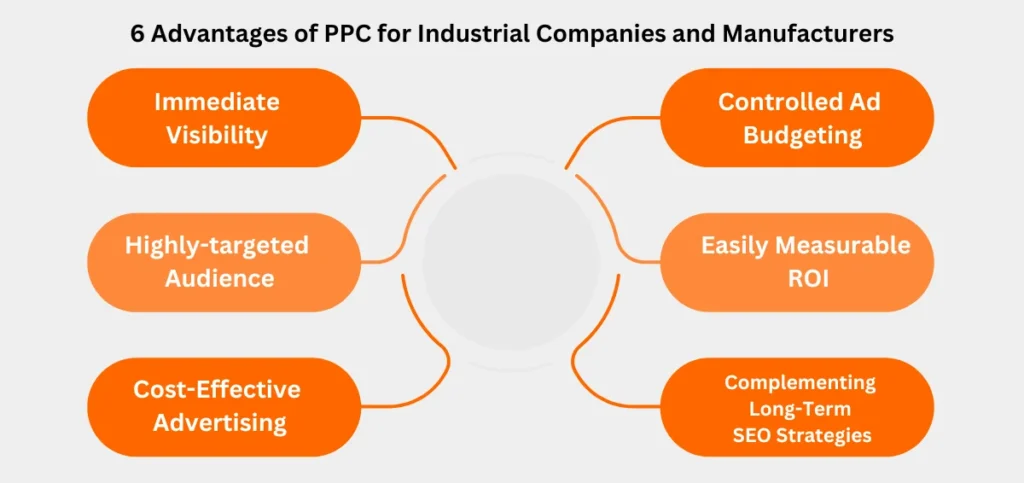
It’s time to take a look at the benefits of PPC for manufacturers:
1. Immediate Visibility
With pay-per-click advertising, you do not have to keep waiting for your ads to climb their way up to the top. Within a few days of posting, these ads appear among top search results to make your business more visible.
2. Highly-Targeted Audience
Sometimes, you may need to target an audience in a particular age group. At other times, your potential customers may be concentrated in a specific location. With PPC, you can easily define these metrics to define your target audience.
3. Cost-Effective Advertising
PPC campaigns mean you need to pay only when someone clicks on your ad. This way, your budget will be directed solely towards genuine prospects.
4. Controlled Ad Budgeting
If you have a specific budget in mind, PPC campaigns can be designed to fit. These campaigns let you set daily and overall spending limits. This control helps you stay on track and ensures you don’t overspend while achieving maximum impact.
5. Easily Measurable ROI
With PPC tools, you can measure ROI accurately, so that your investment aligns with your business goals.
6. Complementing Long-Term SEO Strategies
PPC can be effectively used to energize your SEO strategies. Together, these strategies help manufacturers establish dominant search engine results pages.
Our PPC management services have helped numerous manufacturers improve conversions and sales. Give us a call today and let’s discuss how to grow your business!
Picking the Right PPC Platforms for Manufacturers
One important aspect of successful PPC campaigns is choosing the right platforms. Here are some of the most effective options:
Google Ads
When it is digital marketing, you simply cannot do without Google ads. With its massive reach and advanced ability to target precise audiences, Google ads are a must-have among your digital marketing strategies. Its immense reach and advanced targeting capabilities help increase traffic and conversions. But, remember that this level of popularity also means high competition.
X (Formerly Twitter)
This platform lets you connect with audiences through promoted posts and trending hashtags. Its real-time nature can enhance engagement and create awareness among niche manufacturing communities.
LinkedIn Ads
Since LinkedIn Ads let you target professionals based on job title, industry, and company size, it is the perfect option for B2B campaigns. But remember that these ads often come with a higher cost per click.
Other Platforms
Platforms like Facebook and Instagram are great choices for building brand awareness. Their visual appeal helps create a stronger brand awareness to attract broader audiences.
Read This Case Study: Google Ads Magic: Turning Challenges into $100K Monthly Revenue!
How to Set Up a PPC Campaign for Manufacturers on Google Ads?
Step 1: Set Up your Google Ads account
A Google Ads account is necessary to get started. Provide basic information about your business, such as your business name, URL, and billing details to create an account.
Step 2: Perform Keyword Research
Effective keyword research is the foundation of a successful PPC campaign. Include relevant terms that align with your products or services. Tools like Google’s Keyword Planner can help you locate both general and long-tail keywords.
Step 3: Create the Campaign
The perfect ad must feature a compelling copy that highlights your unique selling points. You must also include attractive visuals and a strong call-to-action (CTA).
Step 4: Design the Landing Page to Convert
Your landing page must persuade your visitors to proceed with the purchase journey. Use relevant keywords, write engaging content, and keep the design clean. Include powerful CTAs to encourage action.
Step 5: Set Budgets and Bidding Strategies
Decide how much you want to spend daily. Google Ads’ automated bidding strategies, such as “Maximize Clicks” or “Target CPA,” make it easy for beginners. If you prefer more control over the budgeting process, manual bidding would be a good option.
Read Also: What is Google Ads Automated Bidding & Its Core Benefits?
Step 6: Do not Forget to Include ad Extensions
Ad extensions enhance your ad visibility and impact in powerful ways. Use relevant site links to direct users to specific pages, such as “Services” or “Contact Us.” If you serve multiple industries, consider including structured snippets, such as “Industries Served: Automotive, Aerospace, Healthcare.”
Step 7: Launch and Monitor the Campaign
Hit the launch button, but don’t assume that’s the end of it! Regularly monitor key performance indicators (KPIs) like click-through rate (CTR) and cost per conversion. Experiment and refine continuously to improve your campaign’s results.
Need help with launching your PPC campaigns? Get in touch with our expert PPC services now!
Key Metrics to Measure PPC Campaign Success for Manufacturers
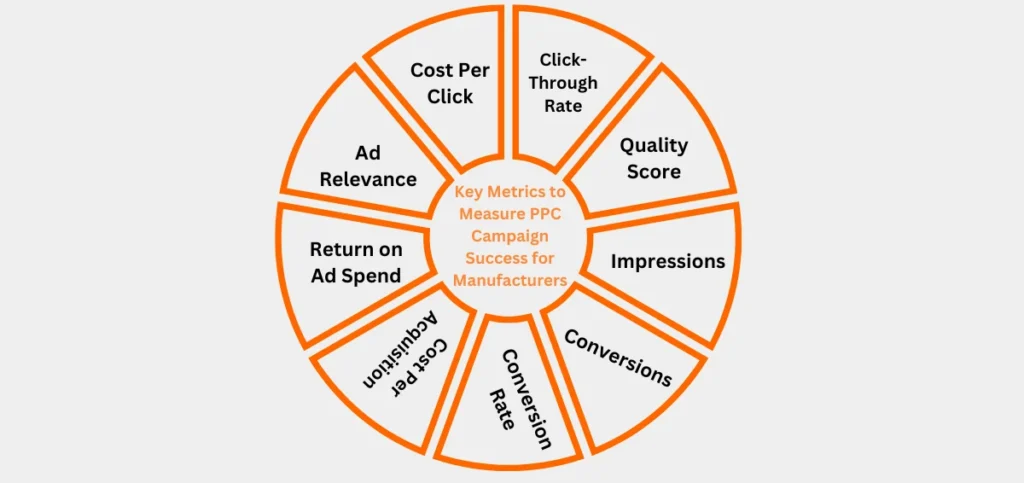
Let’s explore key PPC terms every manufacturer needs to know to measure and optimize campaign performance effectively.
1. Cost Per Click (CPC)
Cost per click (CPC) is the amount you pay for each click on your ad. Ideally, you must aim to attract high-quality clicks at the lowest cost. To maximize ROI, choose keywords with decent search volume and lower competition.
2. Click-Through Rate (CTR)
What percentage of visitors are actually clicking on your ads? That is the click-through rate (CTR). A high CTR indicates that your ad is engaging and working well in guiding users to the next step. If impressions are high but clicks are low, it’s time to revisit your ad copy and targeting strategy.
3. Quality Score
Quality Score is Google’s way of grading your ad relevance, expected CTR, and landing page experience. High scores lead to lower CPC and better ad placements. It’s a critical metric to ensure your campaign components are optimized for success.
4. Impressions
Impressions count how often your ad is shown in search results. This metric helps measure your reach and brand visibility. While impressions don’t guarantee engagement, they are a solid starting point for evaluating campaign awareness.
5. Conversions
Conversions track how many prospects complete a desired action, such as purchasing or signing up. Leads may be visitors who are interested but not ready to buy or visitors ready to make a purchase.
6. Conversion Rate
This refers to the percentage of visitors who convert by taking a specific action after clicking on your ad.
7. Cost Per Acquisition (CPA)
The cost of generating one conversion is your CPA. To find your CPA, divide your total PPC spend by the number of conversions. This metric helps you realize how your campaigns affect revenue.
8. Return on Ad Spend (ROAS)
How much revenue does each dollar spent on PPC bring you? This is your ROAS. If your ROAS is high, it signifies excellent profitability.
9. Ad Relevance
How closely do your ads align with the search intent of your users? Ad relevance helps you measure this aspect. If your ads are relevant, it will lead to better performance and lower CPC.
How closely do your ads align with the search intent of your users? Ad relevance helps you measure this aspect. If your ads are relevant, it will lead to better performance and lower CPC.
Need expert assistance with tracking these metrics? Our PPC marketing agency helps manufacturers make the most of their ads. Contact us today!
Common Pitfalls in Manufacturing PPC Advertising
Here are common PPC mistakes manufacturers must avoid:
- Underestimating Keyword Research: Without researching and identifying the right keywords, your ad spend is likely to go south. Make sure you include high-intent terms relevant to your specific manufacturing niche to attract quality leads.
- Not Focusing on Ad Quality: Low-quality ads are the ones with weak headlines or poor visuals. Such ads can result in fewer clicks.
- Overbidding on Keywords: Spending excessively on highly competitive keywords is a no-no. Such a practice can quickly drain your budget. Instead, bid strategically to balance cost and effectiveness.
- Targeting Irrelevant or Overly Broad Keywords: Using broad or generic keywords can take your business farther from your target audience. Make sure your keyword list aligns with the search intent of your intended audience.
- Not Utilizing Ad Extensions: Ad extensions add extra information, like phone numbers or links, to your ads. Skipping these features means missing out on easy ways to increase click-through rates.
- Ignoring Negative Keywords: Failing to exclude irrelevant searches can waste ad spend. Use negative keywords to filter out users who aren’t interested in your manufacturing services.
- Failing to optimize landing pages: Even the best ads won’t convert if the landing page is unprofessional. What to do? Optimize your landing pages so that they align with the ad’s promise and have clear CTAs.
- Not Paying Attention to Mobile Optimization: Did you know that ‘mobile devices account for over 60% of all global searches’? You cannot afford to miss out on these opportunities. Make sure that your ads, landing pages, and website are optimized for mobile users.
With the expert backing of our PPC management services, you can easily avoid making such mistakes. Schedule a consultation today!
Best Practices for PPC Advertising in the Manufacturing Sector
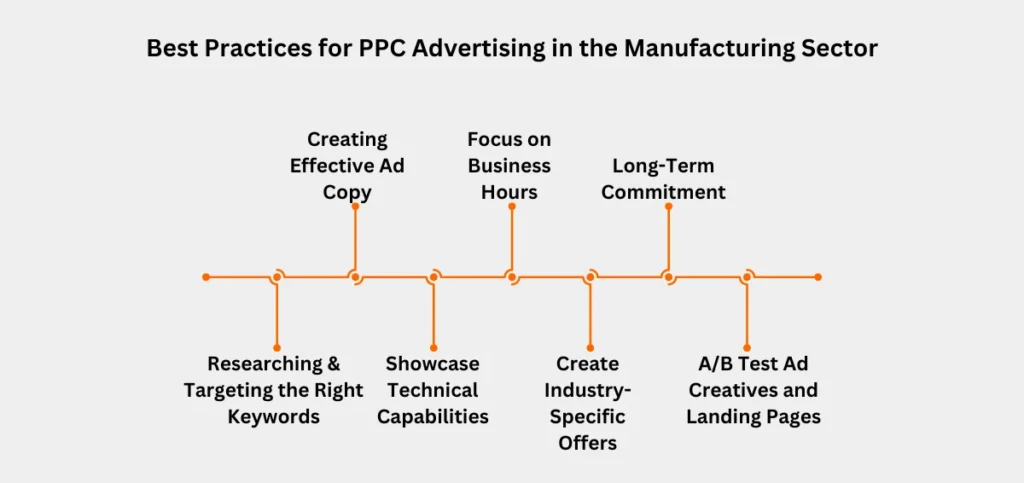
Here are some tips to empower your manufacturing PPC campaigns and achieve better results.
1. Researching & Targeting the Right Keywords
Start with thorough keyword research to find terms that align with user searches. Long-tail keywords, such as “precision CNC machining services,” attract users with specific needs. Include technical terms and certifications like “ISO 9001 compliance” to appeal to industrial buyers looking for quality and expertise.
2. Creating Effective Ad Copy
Your ad copy should grab attention and speak directly to your audience. Use clear, concise language that’s easy to read on both desktop and mobile devices. Always include your main keyword phrase, such as “CNC machining for aerospace.” Address pain points and highlight how your services provide solutions.
3. Showcase Technical Capabilities
Highlight the materials and processes you specialize in, such as “6061 aluminum” or “316L stainless steel fabrication.” Technical details build trust and demonstrate your industry knowledge.
4. Focus on Business Hours
Schedule your ads to run during peak business hours. This is a smart way to catch the attention of decision-makers when they are actively working.
5. Create Industry-Specific Offers
Offer deals customized to manufacturing clients, such as discounts on first-article inspections (FAI). These offers let potential clients assess your quality in addition to highlighting your confidence.
6. Long-Term Commitment
PPC success takes time. You must stay consistent and committed to keep the clicks growing. Focus on optimizing your campaigns and building long-term relationships. And you’ll see a greater ROI over time.
7. A/B Test Ad Creatives and Landing Pages
Experiment with different headlines, visuals, and calls to action to discover what works best for your audience. Test landing page layouts and messaging to ensure a smooth user experience.
Does all this seem overwhelming? Leave the digital marketing part to our Google ads management services. We’ll ensure excellent returns while you focus on growing your business.
Take the Next Step in PPC Success
With PPC, manufacturers can target the right audience at the right time, ensuring every dollar of their marketing budget delivers measurable results. From increasing brand visibility to driving high-quality leads, PPC can transform industrial businesses.
Investing in PPC is about building a sustainable strategy that grows with your business. Whether you’re looking to showcase your technical capabilities, capture decision-makers attention, or stand out in a competitive market, PPC campaigns customized to your goals can help you achieve it all.
Transform your marketing with a leading PPC marketing agency. Let’s achieve great results together—contact us today to get started!

